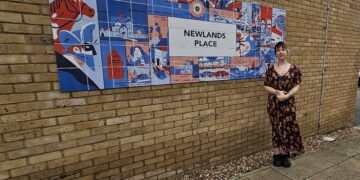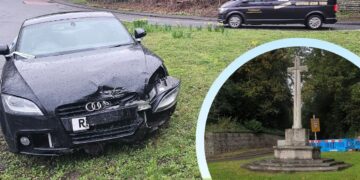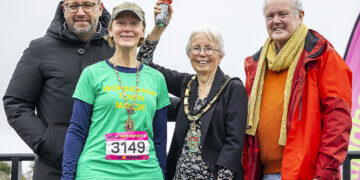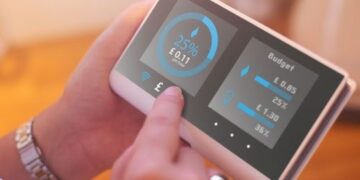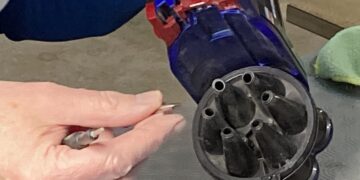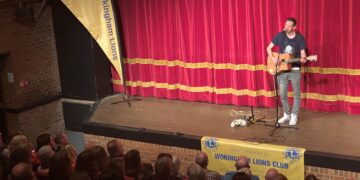A MAJOR campaign has been launched to help victims in abusive relationships in Berkshire.
In a recent survey, a third of people said they had been in more than one abusive relationship while half said it began when they were under the age of 25. Around 45% of victims had lived with abuse for more than 10 years with emotional and verbal behaviour the most common types.
Types of abuse ranged from verbal abuse including shouting and name calling to being isolated from friends or family or having their finances controlled. Victims also spoke about extreme jealousy or obsessive behaviour and threats of violence to keep them under control.
The campaign and the survey are the work of Victims First, which is managed by the Office of the Police and Crime Commissioner for Thames Valley, and supports victims and family members whether or not the crime has been reported to the police.
Called Know This Isn’t Love, it has been rolled out across Berkshire as well as Buckinghamshire and Oxfordshire.
The aim is to focus on the early warning signs of controlling behaviour and emotional abuse to help victims identify any potential signs within their own relationships and seek support.
Coercive control became a criminal offence in 2015 and involves an act or a pattern of acts of assault, threats, humiliation and intimidation or other abuse by a perpetrator that is used to harm, punish or frighten their victim.
While many people associate domestic abuse with physical violence, coercive control recognises the damaging impact of other forms of abuse in relationships as well. This can include isolation from friends and family, depriving someone of basic needs, such as food, monitoring their time and activities and taking control over where they can go, who they can see, what they can wear and even when they can sleep.
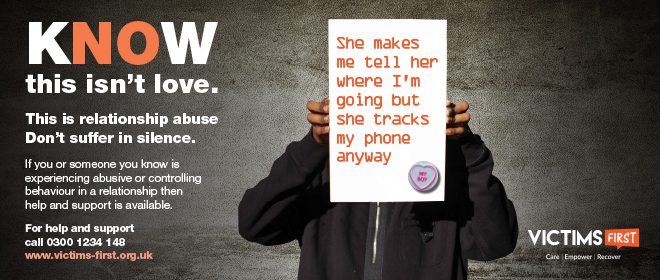
The campaign also focuses on what is known as ‘a particularly nasty form of emotional abuse which involves manipulating someone into doubting their sanity.
Matthew Barber, Deputy Police and Crime Commissioner for the Thames Valley, said: “Controlling and emotional abusive relationships have an extremely damaging impact on victims’ health and wellbeing.
“Victims are unable to live their lives to the full and it can slowly erode their confidence and self-belief.
“Due to the psychological abuse they may be living in constant fear and uncertainty, feeling watched and controlled at all times, resulting in mental health issues such as depression, anxiety and suicidal thoughts.
“The primary aim of the Know this isn’t Love campaign is to help people experiencing abuse, some who may be in the early stages of a relationship, to recognise controlling and abusive behaviours and encourage them to seek help.
“This type of abuse is present across society and can impact both male and females. It’s important we recognise and acknowledge it and not keep it behind closed doors.
“If anyone does feel that the behaviour, they are facing in their relationship is abusive I would encourage them to contact Victims First on 0300 1234 148 for support.”
Wendy Walker from Victims First stressed that abusive behaviour in a relationship is not only physical violence, but can involve “isolating someone from friends and family, monitoring your time or behaviour, threats or verbal abuse, putting you down or controlling what you do or wear.”
“Victims often describe it as feeling like they are walking on eggshells, never knowing what behaviour to expect. This can create an enormous sense of anxiety. It is also not uncommon for people experiencing this type of abuse to be left confused and not sure what is happening and whether it is abuse.
“Abusers will often blame the victim and use a psychological technique called gaslighting to manipulate the victim into doubting their sanity.
“If anyone needs help then Victims First is here for you. We know it can be hard to describe what you have been experiencing but if you contact us we will listen to you and we will work with you to get you some support.”
Louise who experienced coercive control in two relationships said: “It is important to recognise that they won’t be abusive or controlling at all times, in fact they are likely to have redeeming and positive qualities; good with kids, generous, funny. But just because there are good points in the relationship that doesn’t discount the abusive behaviour.
“I didn’t recognise it as abuse at the time and I think I normalised the behaviour. It was many years later when I was being trained to facilitate Freedom Programme that I really confirmed it was controlling and abusive.
“I was young, still a child really, and no one around me at the time pointed out it was abuse so raising awareness is important.
“For anyone who is in an abusive relationship I would say seek out some support so that you can begin to see the patterns of abusive behaviour. I have a kind husband and a happy family now. You can survive this as well and you can move forward and have the life you dreamed of, nothing is impossible.”
Isabella who experienced coercive control said: “If you think you might be in an abusive relationship then listen to your instincts, they are there for a reason. If you feel something isn’t right, then reach out for support and talk to someone in the field of domestic abuse.
“I know leaving a relationship is a hard decision and it takes time to make. But remember above all no one deserves to be treated this way, you deserve better.
“My partner often told me that he would break me but he never did.”
Get help
Victims First is managed by the Office of the Police and Crime Commissioner for Thames Valley and anyone affected by coercive control or domestic abuse can access support through Victims First on 0300 1234 148 or online at www.victims-first.org.uk.

Case Study – Louise
Louise first met her boyfriend when she was a teenager and the controlling behaviour began a few months into the relationship. At first she was flattered by the intensity of it and thought that as he wanted to spend so much time with her he must really care but as time went on his controlling and abusive behaviour worsened. He would verbally and emotionally abuse her by calling her names and making degrading comments about her appearance. Although he was sometimes violent the emotional abuse and controlling and manipulative behaviour were far more frequent and took an impact on her confidence and self-belief.
He would tell her what she could wear and who she could spend time with, slowy cutting her off from friends by manipulation and making untruthful claims about them. The relationship lasted one year, and off and on for a further year or so.
A while later at the age of 17 she began another relationship with a new boyfriend. Although the relationship was good at the beginning and he couldn’t have seemed more different to her first boyfriend he too began to show abusive behaviour after a few months. He verbally abused her into having sex and would control what she did, who she saw and what she wore.
He used intimidation, violence and threats of violence to make her do what he wanted.
They went on to live with each other and the abusive behaviour continued.
When she ended the relationship four years in he began stalking her to convince her to resume the relationship, even making threats to kill himself and her if she didn’t take him back. At the time of the relationship she didn’t realise his behaviour was abusive and thought he just had anger problems.
It was years later, and really confirmed after doing training to facilitate a domestic abuse survivors programme called the Freedom Project as part of her job, that she was able to truly identify the patterns of coercive behaviour in both the relationships and realise that it was abuse. She has since received further support through personal therapy and is now in a healthy and happy relationship.
Her experience has driven her to help others and she has facilitated domestic abuse programmes to help raise awareness of abusive and unhealthy relationships.

Case Study – Isabella
The abuse in Isabella’s relationship started straight away with both controlling behaviour and aggressive sexual contact.
He would use manipulation to force her to do what he wanted often sulking or refusing to speak to her if he didn’t get his own way, forcing her to take the blame and apologise.
As the months went on the abuse worsened.
Her boyfriend would no longer allow her to see her friends and when she was away from him he would monitor her activities and keep track of where she was. He would accuse her of cheating and go through her social media accounts to delete any male friends, eventually closing down her accounts completely.
Her phone was also checked regularly and he would confiscate it to ensure that she couldn’t call anyone.
Over time the psychological torture increased and he would convince her she was going crazy by doing things like hiding her possessions.
He would call her names and make degrading comments about her intelligence and claim that no one could love her. As he often refused to let her sleep, her mental capacity was drained through sleep deprivation. She was living in a state of fear and uncertainty, never sure when the next incident would happen or what mood he would be in.
He took control of her finances, forcing her to do things, including sexual acts, to earn money for necessities such as sanitary products or food. Violence or the threat of violence were also used as a tool for control, in particular to force her into sexual acts, and he would make her stand against the wall or kneel on the floor for hours if she refused to do as he said.
Even when the relationship ended after a number of years he still tried to maintain the abusive behaviour and control.
Victims First is managed by the Office of the Police and Crime Commissioner for Thames Valley and anyone affected by coercive control or domestic abuse can access support through Victims First on 0300 1234 148 or online at www.victims-first.org.uk.




